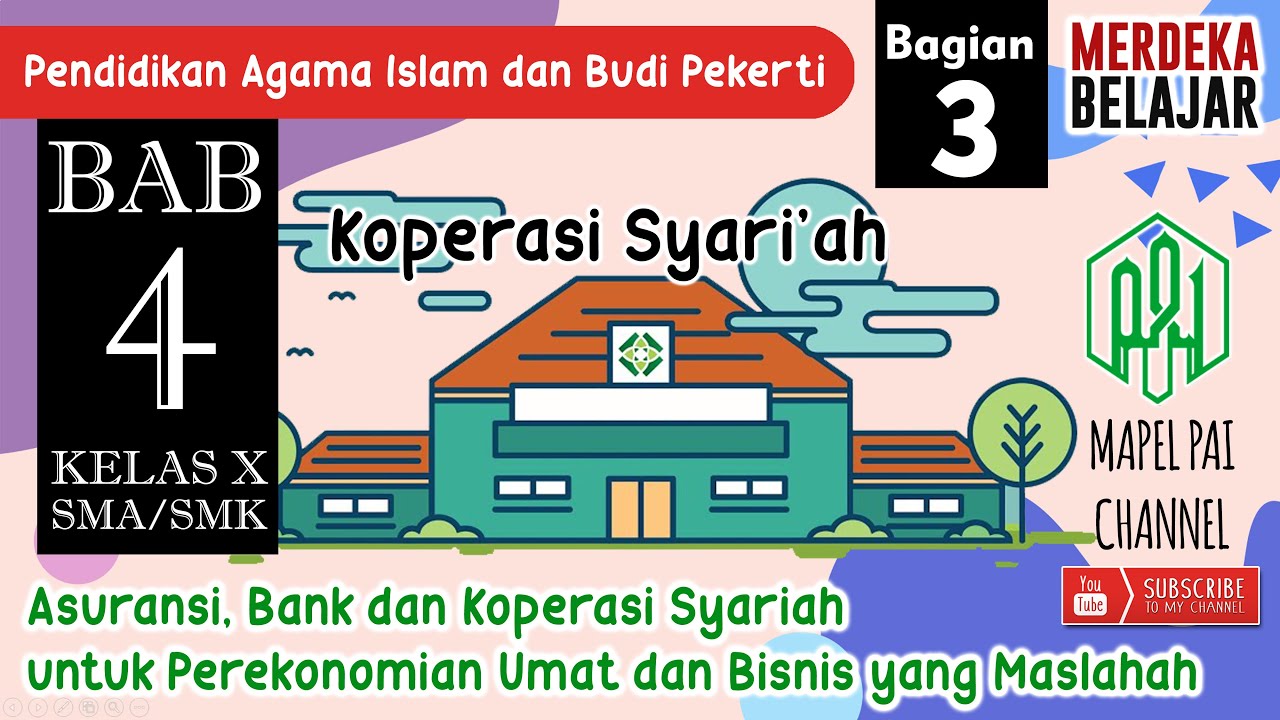Nilai dan Prinsip Koperasi Syariah vs Koperasi Konvensional
Summary
TLDRThis video discusses the key differences between Sharia cooperatives (koperasi syariah) and conventional cooperatives (koperasi konvensional) in Indonesia. It highlights the fundamental principles, such as Sharia's emphasis on fairness, justice, and the prohibition of interest (riba) in contrast to the profit-driven nature of conventional cooperatives. Key differences include the structure of profit-sharing, regulatory oversight, and operational ethics, with Sharia cooperatives emphasizing transparency, accountability, and mutual responsibility. The video provides an informative comparison to help viewers understand how Sharia principles influence cooperative systems, fostering community welfare and adherence to Islamic guidelines.
Takeaways
- 😀 Shariah cooperatives operate based on Islamic principles, ensuring that all financial activities are in line with Islamic law.
- 😀 Conventional cooperatives focus on the well-being of members but operate with profit-driven interest (bunga) on savings.
- 😀 The principle of Shariah cooperatives includes the belief that wealth is a trust from Allah and must be managed justly and fairly.
- 😀 In Shariah cooperatives, profits are shared based on mutual agreement, not interest, and members share both gains and losses.
- 😀 Conventional cooperatives are governed by Indonesia’s Cooperative Law No. 25 of 1992, emphasizing voluntary membership and democratic management.
- 😀 Shariah cooperatives include a Shariah supervisory board to ensure that all operations adhere to Islamic law and ethical principles.
- 😀 Conventional cooperatives distribute profits through interest, while Shariah cooperatives avoid interest (riba) and focus on profit-sharing instead.
- 😀 Shariah cooperatives emphasize values like honesty, transparency, integrity, commitment, creativity, and responsibility in their operations.
- 😀 Unlike conventional cooperatives, Shariah cooperatives can act as institutions for distributing zakat (charitable donations), promoting Islamic charitable practices.
- 😀 The loan system in Shariah cooperatives differs from conventional ones by using Murabaha (buying and selling) instead of lending with interest.
Q & A
What is the main difference between a conventional cooperative and a Shariah cooperative?
-The main difference lies in the principles they follow. Conventional cooperatives operate based on legal frameworks such as the Indonesian Cooperative Law, while Shariah cooperatives follow Islamic principles, including the prohibition of interest (riba) and an emphasis on justice and equity.
How does the profit-sharing system work in a Shariah cooperative?
-In a Shariah cooperative, members do not receive interest on their savings. Instead, the cooperative uses a profit-sharing model where returns are distributed fairly among members based on pre-agreed terms (often through an akad or contract).
What is the role of the Shariah Supervisory Board in a Shariah cooperative?
-The Shariah Supervisory Board ensures that the cooperative adheres to Islamic principles. It is responsible for monitoring operations to prevent activities that conflict with Shariah law, such as interest-bearing transactions.
How do the principles of a conventional cooperative differ from those of a Shariah cooperative?
-Conventional cooperatives emphasize principles like voluntary membership, democratic management, and equitable distribution of profits. In contrast, Shariah cooperatives focus on principles like justice, prohibition of riba (interest), and the belief that wealth is a trust from Allah.
What are the key ethical values that govern a Shariah cooperative?
-A Shariah cooperative is guided by ethical values such as honesty (Sidik), commitment (Istiqomah), transparency (Tabligh), integrity (Amanah), creativity (Fathonah), care (Priya), and responsibility (Masuliah). These values ensure that operations are aligned with Islamic teachings.
Can a conventional cooperative function as a Zakat institution?
-No, conventional cooperatives do not serve as Zakat institutions. They focus on business operations for the benefit of members, while Shariah cooperatives are encouraged to support Zakat as part of their operations.
What is the significance of the prohibition of riba (interest) in Shariah cooperatives?
-The prohibition of riba is central to Shariah cooperatives, as it ensures fairness and equity in transactions. Instead of earning interest, members share profits and losses fairly, based on a partnership model rather than a lender-borrower relationship.
What is the difference in the product distribution system between conventional and Shariah cooperatives?
-Conventional cooperatives offer loans with interest, where members must repay the loan with interest. In contrast, Shariah cooperatives provide products through profit-sharing arrangements (like Murabaha), where no interest is charged, and risks are shared.
How does the monitoring and supervision process differ between conventional and Shariah cooperatives?
-Conventional cooperatives are monitored by oversight bodies that report to the Cooperative Department. Shariah cooperatives, however, are supervised by a Shariah Supervisory Board, ensuring adherence to Islamic principles, such as the prohibition of riba.
What are the advantages of choosing a Shariah cooperative over a conventional cooperative?
-Shariah cooperatives align with Islamic ethical values and provide an opportunity for members to engage in financial activities that are free from interest (riba). This can be especially appealing to individuals seeking to live in accordance with Islamic principles.
Outlines

هذا القسم متوفر فقط للمشتركين. يرجى الترقية للوصول إلى هذه الميزة.
قم بالترقية الآنMindmap

هذا القسم متوفر فقط للمشتركين. يرجى الترقية للوصول إلى هذه الميزة.
قم بالترقية الآنKeywords

هذا القسم متوفر فقط للمشتركين. يرجى الترقية للوصول إلى هذه الميزة.
قم بالترقية الآنHighlights

هذا القسم متوفر فقط للمشتركين. يرجى الترقية للوصول إلى هذه الميزة.
قم بالترقية الآنTranscripts

هذا القسم متوفر فقط للمشتركين. يرجى الترقية للوصول إلى هذه الميزة.
قم بالترقية الآنتصفح المزيد من مقاطع الفيديو ذات الصلة

PERBEDAAN KOPERASI SYARIAH DAN KONVENSIONAL, penjelasan jelas dan ringkas

Bab 4 Asuransi, Bank, dan Koperasi Syariah | Bagian Ketiga Koperasi Syari'ah | Kurikulum Merdeka

bebenomic - KOPERASI MERAH PUTIH 1 - tvri 090425

VIDIO PEMBELAJARAN POWTOON TERINTEGRASI NILAI-NILAI KEISLAMAN MATERI KOPERASI UNTUK SMA/MA

Koperasi Jasa dan Perumahan Benteng Mandiri Indonesia

Sejarah Koperasi di Indonesia | UBGBS info!
5.0 / 5 (0 votes)
